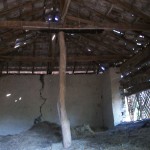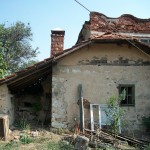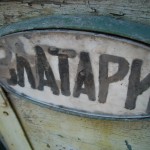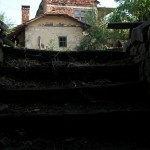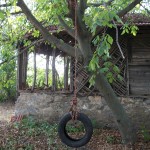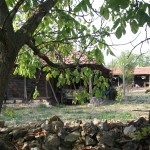Bulgarian Village Motifs
Regional Prayer Conference for the Yambol Village Churches
Regional Prayer Conference for the Yambol Village Churches
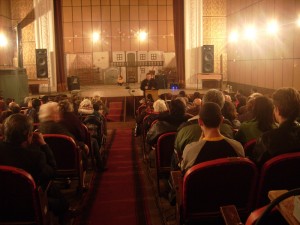 Some 200 people from over a dozen regional churches gathered in the village of Malomir on Saturday at a regional prayer conference. Several ministers and representatives from the Bourgas, Stara Zagora, Haskovo and Sliven regions attended as well. This is the third of four prayer meetings held each year in the area to encourage the village churches, gather the people together for time of rejuvenation and set quarterly goals for each season of the year.
Some 200 people from over a dozen regional churches gathered in the village of Malomir on Saturday at a regional prayer conference. Several ministers and representatives from the Bourgas, Stara Zagora, Haskovo and Sliven regions attended as well. This is the third of four prayer meetings held each year in the area to encourage the village churches, gather the people together for time of rejuvenation and set quarterly goals for each season of the year.
The churches that gathered were congregations with which our teams have worked and ministered with for some 15 years now. Many of the congregations were started and registered during this term of ministry, while others continued their operation having gone through the trials and tribulation of Communism. Unfortunately, the last 20 years of economical, political and social crises in Bulgaria have left their scar on the both the people and the churches. The villages, once flourishing and prospering, are now left to the elderly as the young generation has moved in search for a better life in the big city or in many cases in a foreign land. Thus, the evangelical churches in the Bulgarian villages remain one of the few strongholds of moral encouragement, family values and life as we know it.
The answer to such a great spiritual need is rooted in deep prayer and personal piety, which is exactly what our teams have been trying to accomplish through these quarterly prayer conferences. As the attendance in years past has gradually grown, the Lord has called these people to the ministry and they have faithfully helped our teams in the progress of the work. Therefore, they were all encouraged to gather once again while we shared the Word in several sessions throughout the day. Our message focused on the subject of personal prayer and its leading role within the life of the local church. The efforts of all were well rewarded by a powerful move of the Spirit during the time of prayer, after which people were encouraged by the announcement of one more regional prayer conference for this year, which will probably take place during the holiday season.
Village Ministry
 Last Saturday we were again privileged to minister in the villages of the Yambol region. Services were held consecutively in the churches of Kamenetz, Lulin, Alexandrovo and Polyana. Normally, it is somewhat difficult to gather the people in the villages due to harvest season when they are working in the fields all day long with no way to contact them. However, when our team arrived on site, the people from the local villages have taken the day off due to being warned by national news of the upcoming heat wave. Most of them had just gathered under the tree shadows by the close convenient store seeking shelter from the sun and waiting for a fresh water supply to arrive from Yambol as it was the hottest day of the year so far of some 105(F) degrees.
Last Saturday we were again privileged to minister in the villages of the Yambol region. Services were held consecutively in the churches of Kamenetz, Lulin, Alexandrovo and Polyana. Normally, it is somewhat difficult to gather the people in the villages due to harvest season when they are working in the fields all day long with no way to contact them. However, when our team arrived on site, the people from the local villages have taken the day off due to being warned by national news of the upcoming heat wave. Most of them had just gathered under the tree shadows by the close convenient store seeking shelter from the sun and waiting for a fresh water supply to arrive from Yambol as it was the hottest day of the year so far of some 105(F) degrees.
This allowed for us the opportunity to minister to the crowd and share once again the Message of Eternal Life. The church members were encouraged by the service as many of their neighbors and colleagues were hearing the Good News for a very first time. We committed to continue the services through Wednesday and then our team will reconvene in Yambol Wednesday evening as we will be broadcasting LIVE our services in Yambol on the internet at 12:00 PM ET.
Tie the priest and you will have peace in the village
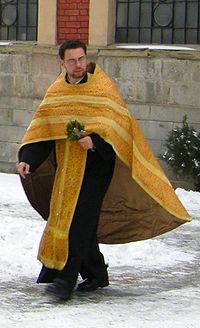 “Tie the priest and you will have peace in the village,” an ancient Bulgarian proverb says. This is exactly what the Bulgarian Chief Prosecutor did last July when he ordered police forces to raid over 250 Orthodox Churches and expel their priests who belong to the so-called Alternative Synod. The synod split from the “traditional” Orthodox Church in 1992 rejecting the authority of Patriarch Maxim, whom they claimed was installed in the 60s by the Communist Regime with the purpose of state control over the church.
“Tie the priest and you will have peace in the village,” an ancient Bulgarian proverb says. This is exactly what the Bulgarian Chief Prosecutor did last July when he ordered police forces to raid over 250 Orthodox Churches and expel their priests who belong to the so-called Alternative Synod. The synod split from the “traditional” Orthodox Church in 1992 rejecting the authority of Patriarch Maxim, whom they claimed was installed in the 60s by the Communist Regime with the purpose of state control over the church.
The Chief Prosecutor justified his order with the recently accepted Bulgarian Confessional Act (Law of Religions). The government of Simeon hopes to finally stop the schism in the Orthodox Church, while a number of human right supporters both in and outside Bulgaria see this act and the new Law of Religions as an attempt of the state to control the religious life in Bulgaria.
Why focus on fixing the church, when Bulgaria has so much to deal with right now? The government was unable to show real improvement un Bulgaria after the promised 800 days were over. While the Internality Currency Board refused to raise minimum income to over $150 per month, the prices of goods and service continue to grow rapidly. Over one million Bulgarians have already left Bulgaria to find a better life somewhere else on the globe. The declining Bulgarian economy combined with the growing rates of crime, corruption and unemployment are not helping much either.
The events accompanying the police actions against the priest of the alternative synod were shocking. The Bulgarian medics prosecuted for allegedly infecting children with HIV in Libya remained in prison with pending death sentences, while Bulgarian government representatives are unable to find a solution of the situation. Two Bulgarian drivers were captured and eligibly murdered by terrorist in Iraq. While the Bulgarian government was still attempting to positively identify the decapitated bodies, terrorists threatened to turn Bulgaria into a blood bath due to its alliance with the United States. The following week, six Bulgarian men allegedly connected with organized crime and drug traffic, were gunned down in a Sofia restaurant by masked men driving police marked vehicles. To rightfully finish this trend, on the eve of the Olympic Games in Athens, the president of the Bulgarian Olympic Committee was broadcasted by BBC’s “Panorama” while promising to secure votes for the next Olympics in favor of London.
And in all, the most successful Bulgarian government operation was the “tying of the priests” and dealing with the schism within the Orthodox Church. This may seem to some as tying the priest in order to have peace in the village, but even more it looks like an attempt to remove the attention from other much larger problems which the Bulgarian government is simply unable to solve.


